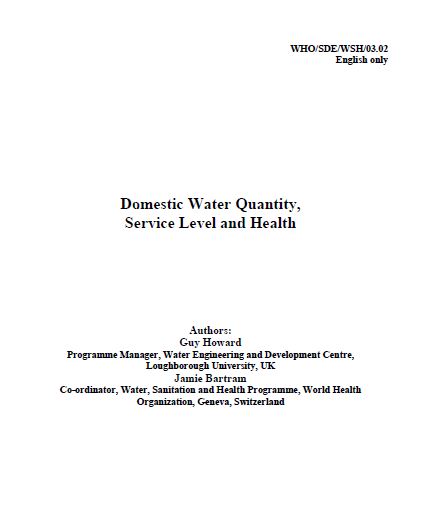Domestic Water Quantity, Service Level and Health
 |
rapport Apr 2003 ; 39 pages
Aut. Jamie Bartram & Guy Howard
Ed. WHO - Cairo
Téléchargeable sous format: PdF
Téléchargeable chez l'éditeur
Abstract:
The quantity of water delivered and used for households is an important aspect of domestic water supplies, which influences hygiene and therefore public health. To date, WHO has not provided guidance on the quantity of domestic water that is required to promote good health. This paper reviews the requirements for water for health-related purposes to derive a figure of an acceptable minimum to meet the needs for consumption (hydration and food preparation) and basic hygiene.
Based on estimates of requirements of lactating women who engage in moderate physical activity in above-average temperatures, a minimum of 7.5 litres per capita per day will meet the requirements of most people under most conditions. This water needs to be of a quality that represents a tolerable level of risk. This volume does not account for health and well-being-related demands outside normal domestic use such as water use in health care facilities, food production, economic activity or amenity use.
The basic need for water includes water used for personal hygiene, but defining a minimum has limited significance as the volume of water used by households depends on accessibility as determined primarily by distance and time, but also including reliability and potentially cost. Accessibility can be categorised in terms of service level.
A summary of the degree to which different levels of service will meet requirements to sustain good health and interventions required to ensure health gains are maximised is shown in table S1 below.
Mots clefs: |
accès à l'eau (CI) (DT) (OP) (ope) , consommation d'eau (CI) (DT) (OP) (ope) , santé (CI) (DT) (OP) (ope) |
Editeur/Diffuseur: |
|
WHO
-
World Health Organization Regional Office for the Eastern Mediterranean - Cairo - Egypte |
En cas de lien brisé, nous le mentionner à communication@pseau.org